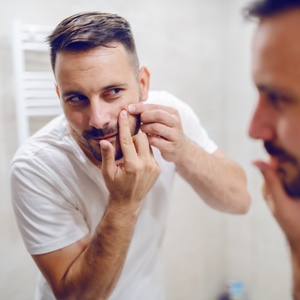Blog
Welcome to FaceForward
Get the scoop on all things beauty, wellness, and skincare.

Acne is at best irritating and at worst painful and embarrassing. Most blemishes go away within a few weeks, but sometimes pimples are more persistent. If you’ve got a pimple that won't go away, consider these tips for dealing with that persistent bump.
Warm compresses are a simple way to treat blemishes that can help ease the irritation of your acne and loosen skin to begin the process of healing. Get a clean washcloth and soak it in warm water. Hold it to the area of the skin where the pimple is. Leave it there for 5-10 minutes until it’s cooled to room temperature and repeat as desired throughout the day. This can soothe angry skin and help reduce inflammation.
Acne occurs when oil and other debris clog the pores and hair follicles in your skin, and for that reason it’s important to clean your skin regularly. Use warm water and a mild facial cleanser that won't aggravate your skin. Most skin does best when it's cleaned twice a day and after getting particularly sweaty or dirty. Washing more than that – particularly for those with dry or sensitive skin – can cause irritation, possibly leading to more acne. Gentle and not overly frequent is best when it comes to washing your face.
Leaving acne alone can be difficult. It’s tempting to scratch, pick at, and otherwise mess with those bumps and pustules, particularly when they’re white-headed or angry-looking. But doing so can introduce new bacteria into open wounds, causing further aggravation and inflammation. Keep your hands off persistent pimples or risk lengthening the time they stay – and the possibility of scarring.
While you do want to keep your face clean, aggressive scrubbing can cause your skin to become irritated. Exfoliating can be a useful tool in combating acne, but over-aggressive exfoliation with harsh exfoliants can work against you. Instead, gently wash the area with products that don’t exacerbate your problem or damage sensitive skin. Your fingertips can be enough to give skin some basic exfoliation.
Acne medication can be a powerful tool in the treatment of persistent pimples. Different ingredients can have different effects, though, and it's important to choose products with well-researched and clinically proven ingredients.
Look for ingredients that are used and recommended by dermatologists, like retinoids, some antibiotics, and more.
Tretinoin is a retinoid and common ingredient in prescription acne treatments, for instance. It’s a form of synthetic Vitamin A used to reduce acne through accelerated turnover of healthy skin cells. Clindamycin is an antibiotic that helps stop the growth of bacteria that causes acne. Another powerful ingredient is niacinamide, a Vitamin B-3 derivative that helps minimize acne-triggering inflammation.
Topical medications, particularly prescription options, can be a powerful tool in fighting acne. But a frequent mistake for those beginning on a new acne medication is to start off too strong.
Particularly with retinoids like tretinoin, the skin needs some time to adapt. Your dermatologist or prescribing clinician will give you precise directions on use of topical acne treatments, which may involve easing into your treatment regimen over the course of a few weeks with every-other-day treatment rather than daily. Whatever your regimen, follow your clinician's directions.
We spend a significant amount of our lives in bed with prolonged direct contact with bedding. If your bedding is dirty, it can contribute to persistent acne.
Pillows and pillowcases especially can contribute to acne as so much of your time sleeping is spent in the same spot, meaning oils and dead skin cells accumulate at quicker rates. Likewise, other materials like the band of a hat or scarves that are frequently touching your skin, can contribute to acne development. Wash anything that touches your face at length regularly.
Many makeup and skincare products have ingredients that can contribute to acne. These can include lanolin, algae extract, oils and acids.
Look for products that are labeled as non-comedogenic or oil-free, intended to avoid blocking pores.
Some products that are fine for your friend’s skin might not be great for yours, too, and knowing what works well for you can take some trial and error.
Treating acne can be a process. Don’t expect your pimples to disappear overnight. Most medications treat the causes of acne to reduce its appearance over time, not necessarily the acute manifestation of a large pimple.
Although you may want the offending blemish gone instantaneously, it can take up to six weeks for a pimple to fully heal and go away. Give medications time to do their magic.
Acne can have many causes, from hormonal changes to prescription medications, and it can sometimes be difficult to determine the root cause of your acne.
Nava MD is here to help the average person get prescription-grade acne treatments personalized for their situation. They're formulated for you and then delivered to your door, if prescribed. It's all done online, and you can follow up with your clinician any time through the Nava MD member portal.
With virtual visits done online, Nava MD make access to a dermatologist easier. It's also affordable. Acne medications don’t need to be expensive, and direct ordering can save money compared to in-person dermatology visits and follow-ups.
Don't let persistent pimples get you down. Practice healthy skincare that gives your acne the attention it needs. Start with a prescription acne medication, done online, from Nava MD.
Get your anti-acne treatment today, if approved, by clicking here.
https://www.ncbi.nlm.nih.gov/pmc/articles/PMC5986265/
https://pubmed.ncbi.nlm.nih.gov/31613567/
https://www.ncbi.nlm.nih.gov/pmc/articles/PMC3080563/
https://pubmed.ncbi.nlm.nih.gov/28076744/
This article is intended for informational purposes only and should not be considered medical advice.
Consult a healthcare professional or call a doctor in the case of a medical emergency